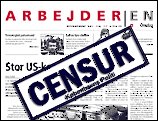Particular zeal in defending freedom of speech in Jyllandsposten case

“As soon as we get to the debate on the Mohammed drawings there are no limits to Anders Fogh Rasmussen’s defense of "freedom of press”, the editor of the Danish paper “Arbejderen” (The Worker) said at the prime minister’s weekly press conference on March 14.
But when it concerns the Danish Police’s removal of the association Opror’s appeal for support to the PFLP and the FARC, the Prime Minister says this is all right. It is a matter for the police, he says, even though in other contexts, for instance Jyllandsposten, he has said it is a matter for the courts to decide when there is a violation.
The police have ordered the internet service provider (ISP) to remove the appeal from the “Arbejderen”’s homepage. Legal experts on the press and the association of Danish newspaper publishers have deemed this illegal according to Danish press law, as it is not up to the ISP to edit material.
On February 28th the Member of Parliament Line Barfod asked the Prime Minister about the case in question time in parliament. The PM is also minister of the press. She asked: “Will the prime minister account for how the police intervention in utterances and removal of pages on the Internet, as has been the case with the subjoined appeal, is in compliance with our fundamental freedom of expression rights, that the prime minister talks so warmly about at the moment”?
The appeal from Opror:
The ‘war on terror’ threatens us all – defend freedom of expression, human rights and international solidarity!
Appeal from ‘Rebellion’ (Denmark) to European movementsThe Danish association ‘Rebellion’ appeals to all European movements for democracy and international solidarity to join it in challenging national anti-terrorist legislations, the ‘terrorist list’ of the European Union, and the so-called ‘international war on terror’. ……link to rest of text.
Does this fall under freedom of expression? The Opror text has an appeal for help to funding organisations on the USA and EU terror lists. The people in charge of Opror risk up to 10 years imprisonment. This is out of proportion to what they have done!
Two things seem to be mixed up: Freedom of speech and the question of censoring the correct link in the distribution process. Of course it was wrong to intervene at the level of the ISP. That would correspond to preventing a printer from printing a newspaper. It is the editor that should be prevented from publishing a message in case of the use of censorship.
Whether freedom of speech is violated is questionable. In a sense it is, as the appeal to support is an utterance and hence something that should be freely applied. Making an utterance is not the same as actually paying money.
In addition, one might say that the terror lists are in their present form a gross violation of freedom to make an organisation and work politically. The FARC may have used terrorist methods and they have kidnapped innocent people, but the Colombian government has collaborated with the self-defence forces, and these have penetrated the Colombian state apparatus and many members of the Colombian parliament are on their paying lists. The FARC are in a fierce struggle with this repressive state. In a war-like struggle it may be difficult not to transgress human rights. Apart from that the FARC are fighting against feudal land distribution and for social and civil rights for ordinary colombians. It is a problem that people are no longer permitted to help them in their fight, - indeed even express indignation or sympathy for fear of being on the wrong side in the "war on terror". This so-called "war" is used as a means to subjugate vital civil rights.
When the FARC was put on the EU's terror list there was a long moment of hesitation from some countries, particularly Sweden and France. Perhaps they should reconsider the case.

1 Comments:
One thing is crystal clear, this country is run by the CIA. This bit of hypocracy should illuminate that fact to even Morten Kock.
Post a Comment
<< Home